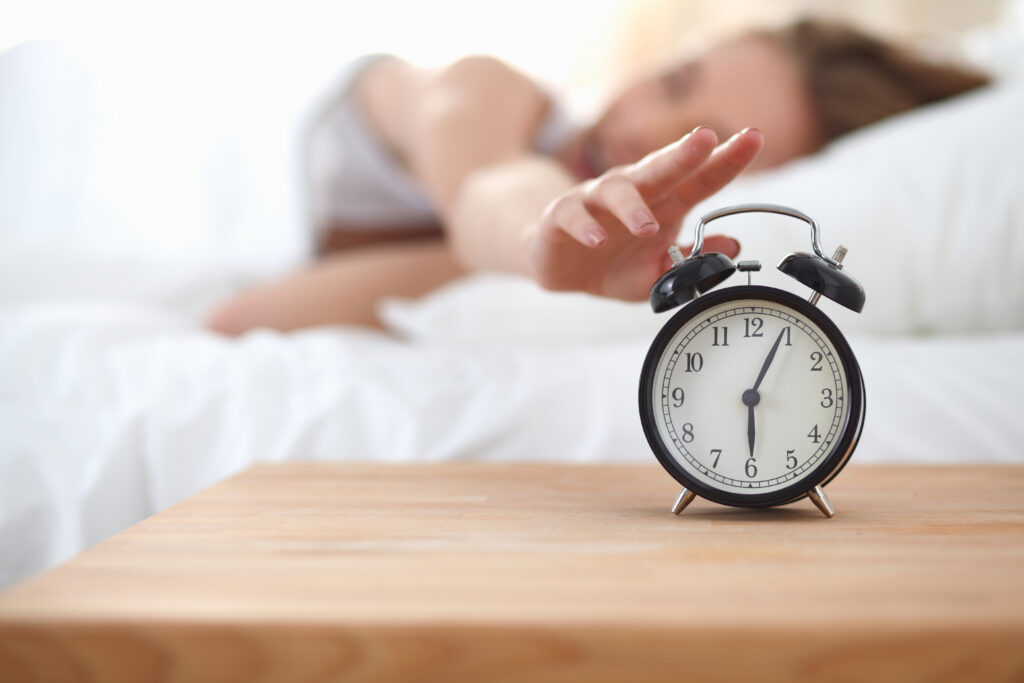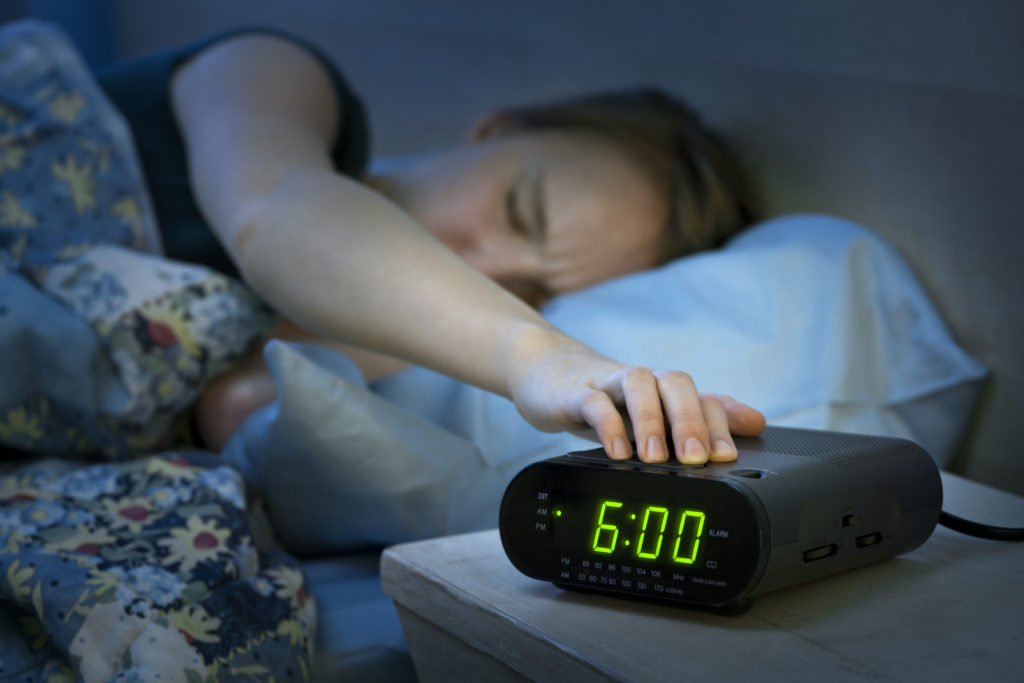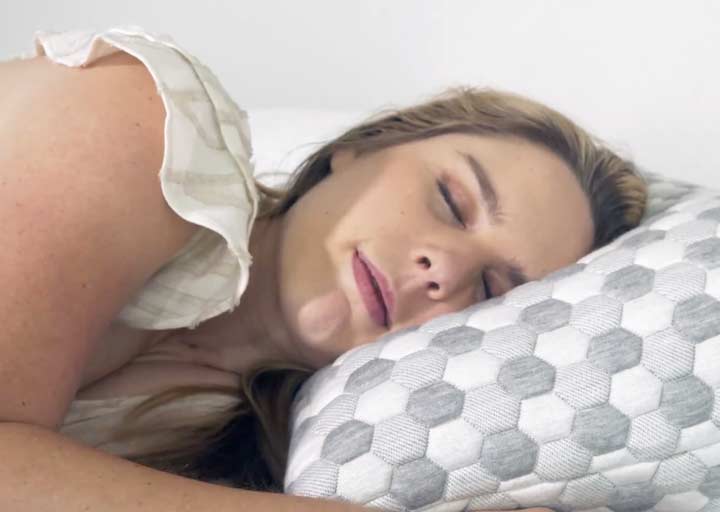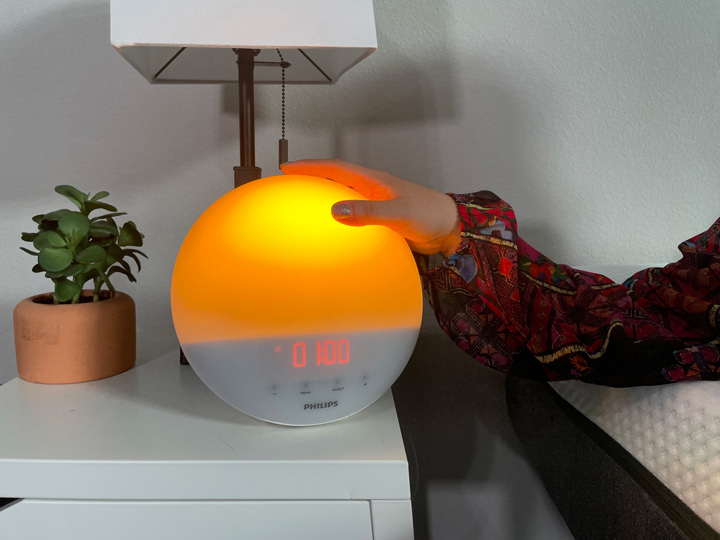Waking up on time can sometimes feel like a massive nuisance. Many people feel unready to get out of bed when they hear their alarm go off in the morning. Naturally, hitting the snooze button seems like the perfect solution to catch some more Zzzs to feel better rested for the day.
We’ll go over the potential benefits and risks of hitting snooze and share the most recent studies about how snoozing impacts your sleep. We’ll also share some tips on how to wake up feeling as well rested as possible.
Does Hitting Snooze Disrupt Your Sleep Cycle?
You may have heard the myth that hitting the snooze button can negatively impact your sleep cycle. This refers to the stages of sleep you repeat between four to six times over seven to nine hours.

Some sleep experts tell people not to press the snooze button, because the alarm could wake you up during your deep sleep stage. They claim that hitting snooze restarts the sleep cycle when you are about to wake up, which can make you feel groggy and disoriented. That said, there isn’t a lot of research out there suggesting that hitting snooze can disrupt your sleep that much.
Hitting the snooze button usually only gives you an extra five to 15 minutes of sleep. Even though this is a short amount of time, two studies suggest that snoozing can help you feel less drowsy in the morning.
The Truth About Snoozing
A 2022 study found that snoozing was not associated with higher amounts of sleepiness throughout the day. Snoozers also did not report getting inadequate sleep.
A 2023 study found that snoozers performed better on three out of four tests, in comparison to people who didn’t hit the snooze button. Participants in this study said that snoozing did not seem to affect their level of sleepiness or productivity throughout the day.
Snoozing The Right Amount
Many people hit the snooze button in the morning so they can relax in bed a bit longer. And there’s nothing wrong with that! But snoozing the right amount of time is key.

In general, you want to snooze long enough to overcome sleep inertia, which is another term for morning grogginess. Sleep inertia typically lasts between 20 and 30 minutes. So if your alarm goes off every ten minutes, you’ll want to hit the snooze button two or three times.
But be mindful: Hitting snooze for over 30 minutes can make you feel groggy. That’s because you tend to reach a deeper stage of sleep after this amount of time.
If you’re sleep deprived, sleep inertia can last up to two hours. That means no amount of snoozing will help you feel rested and alert.
Why Is Snoozing So Addictive?
According to multiple studies, between 57% and 70% of adults hit snooze at least sometimes. These studies also found that people are more likely to hit the snooze button on workdays than on days off.

The most common reason people snooze? According to many studies, the main reason is that people were too tired to wake up. People also snooze because they feel cozy in bed.
Researchers found that some groups of people are more likely to rely on the snooze button than others. For instance, snoozers tend to be female and young adults. Night owls are also more likely to snooze, regardless of their age or gender.
How To Stop Snoozing in the Morning
Snoozing isn’t inherently bad, but it could be a sign you’re not getting enough restful sleep. If you have trouble waking up in the morning, you may need to make changes to your habits and sleep environment. If you are trying to ditch the snooze button, here are a few suggestions.
Choose a Gentle Alarm Sound
Snoozing can make people wake up several times, which can raise their resting heart rates. One way to wake up less abruptly is to use a gentle alarm sound instead of a jarring noise. A 2020 study suggests that waking up to a melodic alarm can make people feel less groggy in the morning, when compared to a neutral sound like beeping.
Choosing an alarm sound with a pleasant melody and moderate tempo may help you feel well-rested when you first wake up. One study found that people felt more attentive after waking up to a melodic alarm that was 105 beats per minute (BPM).
You can also try gradually increasing the volume of your alarm to slowly wake you up.
Light Exposure
Light exposure plays a large role in regulating your body’s circadian rhythm, also known as your sleep-wake cycle. Using light instead of sound is a great way to gently wake up and feel alert. Exposure to bright light 30-60 minutes after waking up is associated with lower melatonin levels, the hormone that helps promote sleep, and increased cortisol levels, a stress hormone that affects your energy level. Try using a sunrise alarm clock to slowly brighten your bedroom in the morning.

Get Out of Bed
One good way to nix your snoozing habit is to get out of bed when your first alarm goes off. Even though staying in bed for a few minutes is tempting, making yourself stand up and walk around will help you resist the urge to continue sleeping.
The simplest way to get yourself out of bed is to place your alarm out of arm’s reach. Or you can use a quirky alarm like the Clocky that rolls around your bedroom until you catch it to turn it off.
Improve Sleep Hygiene
If you wake up feeling rested and restored, you’re probably less likely to hit the snooze button. To eliminate or reduce sleep inertia, improve your sleep hygiene.
For the best quality sleep, avoid alcohol and caffeine before bedtime. It is also wise to limit your exposure to electronic devices that emit blue light. Instead, practice relaxing habits that help you unwind before bed.
Create a dark, quiet, and cool sleep environment that promotes a restful night’s sleep. It’s also help to stick to a consistent bedtime and wake time every night.
The Takeaway
Recent studies suggest snoozing may not deserve a bad rap. Snoozing up to 20-30 minutes can offset sleep inertia and could improve your perceived performance by briefly extending the amount of time spent in light-stage sleep. However, snoozing for long periods may extend sleep inertia, decrease your sleep quality long-term, and it may be a sign that you are sleep-deprived. 
FAQs
Is it better to hit snooze or get up?
Snoozing is not inherently a bad habit, and in some cases it helps sleepers feel more alert and well-rested. That said, if you want to snooze for longer than 30 minutes, it could be a sign you’re sleep deprived.
Why does it feel good to snooze?
When you hit the snooze button, you are prolonging the amount of time you spend in light-stage sleep. Research suggests that waking up in a lighter stage of sleep may decrease the amount of sleep inertia, or morning grogginess, you may experience.
What is the perfect snooze time?
If you choose to snooze, the ideal amount of time spent snoozing is less than 20-30 minutes. After snoozing for 30 minutes, you may begin to drift back into deeper stages of sleep. Waking up during stage 2 or stage 3 sleep may make you feel more groggy than if you did not snooze at all.
What percentage of people hit snooze?
Studies have shown anywhere between 57% and 70% of adults hit the snooze button at least sometimes. In a study with university students aged 18-28, 47.5% of participants who snoozed reported hitting snooze seven days a week.

